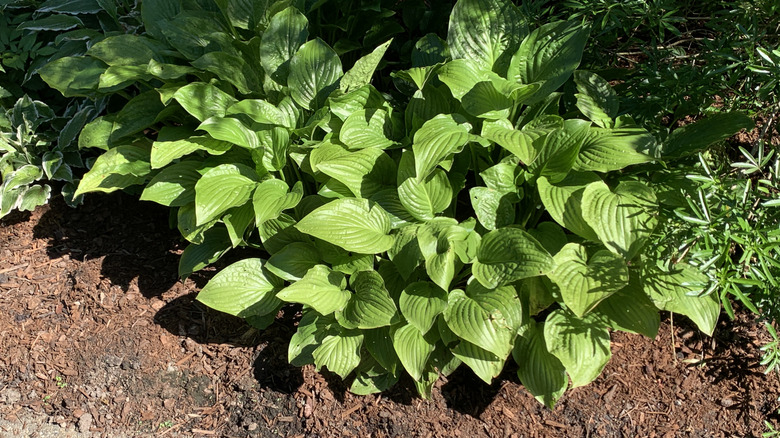How To Prevent Deer From Eating All Of Your Hostas
We may receive a commission on purchases made from links.
Hostas love shade, grow easily, and are perfect for making your garden look fuller on a budget. Their low-maintenance nature, along with their leaves' diverse coloring and shapes, makes them a home garden staple. When the plants bloom with glorious, bell-shaped flowers, some hostas add visual appeal and can even attract pollinators, filling your garden with bees and hummingbirds. There's another big fan of hostas, though, and they're likely not welcome in most yards: deer. Deer love hosta, treating it as much of a treat as humans do an ice cream cone. So, how do you prevent them from eating all of your hostas? Erecting physical barriers and using non-toxic deterrents can help save your plants from becoming a salad bar.
Deer are known for extensive damage to these plants, especially if they're readily available when other food sources are scarce. Deer often enjoy biting the crunchy leaves, and you might find them treating themselves to an all-they-can-eat buffet right in your garden. All hostas are susceptible to deer damage, but they will frequently target the young plants for their tender, soft leaves as they're easier to eat. It's not out of the ordinary for you to find a hosta completely reduced to a stub if you live in an area with a high deer population. When you're at your wits' end and want ways to keep deer out of your yard, you can try these helpful methods to save your hostas.
Stopping deer from eating hostas with physical and non-toxic barriers
Setting up barriers, including fences, lets you mount some of the best defenses against deer. Setting up a small fence around hostas and other plants deer find palatable is a good approach, especially since an entire fence may be cost-prohibitive. An alternative may be protective netting, ideally anchored to stakes to prevent deer from removing it. Options like AlpineReach Garden Netting allow for good airflow while still shielding the tempting leaves from deer and other critters. If you don't want to buy a whole set of netting, Michigan State University recommends using old tomato cages or milk crates in the garden, tying them down as a makeshift barrier. Stay away from any option with large holes.
Adding plants that deer don't frequently disturb may add another layer of protection to your hostas as well as the rest of your garden. However, no plant is truly deer-proof, and they may simply step over the undesired plants to get at your hostas. A combination of fences and plants meant to deter them is best. Try planting landscape plants frequently ignored by deer, such as anise (Pimpinalla anisum), catmint (Nepeta sp.), and giant reed (Arundo donax). Combine these efforts with natural ingredients that can deter deer from your yard, coating the hosta leaves with a combination of water, cayenne pepper, and dish soap. Another possible solution? Spray urine from predatory animals such as coyotes, which may make them think the animal is nearby. Whatever you choose to use for your barrier(s), make sure you aren't complacent, and try another alternative if one isn't working.

